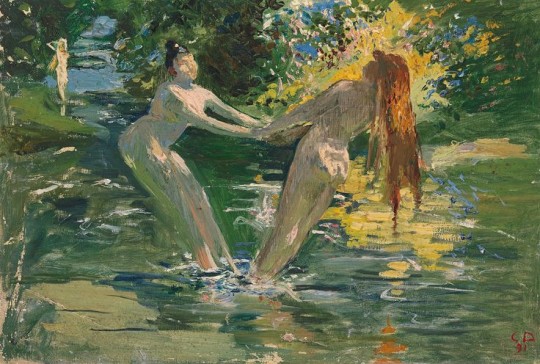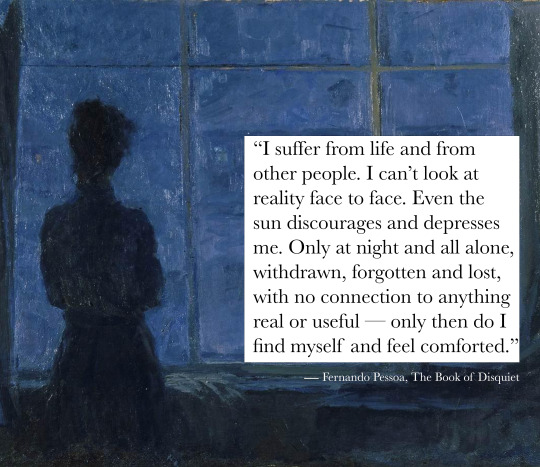#The book of Disquiet
Explore tagged Tumblr posts
Text

Fernando Pessoa, from The Book of Disquiet
Text ID: By thinking so much, I became echo and abyss. By delving within, I made myself into many.
#fernando pessoa#the book of disquiet#quote#autobiography#biography#nonfiction#nonfiction literature#portuguese literature#lit#diary#miscellanea
3K notes
·
View notes
Text

― Fernando Pessoa, The Book of Disquiet
5K notes
·
View notes
Text

- Fernando Pessoa - The Book of Disquiet.
#words#poems and poetry#poems and quotes#quotes#typography#literature#poem#translated literature#portuguese literature#the book of disquiet#fernando pessoa#on self
168 notes
·
View notes
Text

Fernando Pessoa, an excerpt from “The Book of Disquiet”
75 notes
·
View notes
Text
My God, my God, whose performance am I watching? How many people am I? Who am I? What is this space between myself and myself?
Fernando Pessoa, The Book of Disquiet
#Fernando Pessoa#The Book of Disquiet#dark academia aesthetic#academia aesthetic#chaotic academia#classic academia#light academia aesthetic#dark academia#soft academia#romantic academia#study motivation#studyspo#studyinspo#studying#study aesthetic#study notes#study space#studygram#study blog#light academia#classic literature#poetry#art academia#art#books#libraries#book quotes#literature quotes#deep quotes#life quotes
770 notes
·
View notes
Text

The Book of Disquiet - Fernando Pessoa
63 notes
·
View notes
Text
“I wasn’t meant for reality, but life came and found me.” ― Fernando Pessoa, "The Book of Disquiet"
From @journalofanobody & @anetteva
117 notes
·
View notes
Text

The Book of Disquiet / Fernando Pessoa / 1982
88 notes
·
View notes
Text

— Fernando Pessoa, The Book of Disquiet
#quotes#dark academia#words#classic academia#classic literature#writing#fernando pessoa#the book of disquiet#on perfection#god is silent#god#saints
60 notes
·
View notes
Text

Fernando Pessoa, from The Book of Disquiet
Text ID: Everything in me tends to go on to become something else. My soul is impatient with itself, as with a bothersome child; its restlessness keeps growing and is forever the same. Everything interests me, but nothing holds me. I attend to everything, dreaming all the while…
#fernando pessoa#the book of disquiet#quote#autobiography#diary#nonfiction#nonfiction literature#portuguese literature#lit#miscellanea
644 notes
·
View notes
Text
All it would take to make a catalogue of monsters is to photograph in words the things the night brings to drowsy souls unable to sleep. These things have all the incoherence of dreams without the alibi of sleeping. They hover like bats over the soul’s passivity, or like vampires that suck the blood of submission.
They’re larvae from the debris on the hillside, shadows that fill the valley, remnants left by destiny. Sometimes they’re worms, loathsome to the very soul that cradles and breeds them; sometimes they’re ghosts that sinisterly skulk around nothing at all; sometimes they pop out as snakes from the absurd hollows of spent emotions.
Fernando Pessoa, The Book of Disquiet
278 notes
·
View notes
Quote
To kill our dream is to kill ourselves. It is like mutilating our soul. The dream is what is most truly, impenetrably, ineradicably ours.
Fernando Pessoa, The Book of Disquiet
808 notes
·
View notes
Text
What are those people who wake up from dreams? Where else do they go?










Fernando Pessoa, The book of disquiet / Call Down The Hawk Maggie Stiefvater / artwork by Ram Han / We Should Be Well Prepared Mary Oliver / Dreams tonite by Alvvays / unknown / Bastille / The Dream Thieves by Maggie Stiefvater /Sleeping Beauty / Dreams by The Cranberries
#poetry#poetic#q#books#short poem#aesthetic#mary oliver#poems#paintings#digital art#Ram Han#the raven cycle#the dream thieves#maggie stiefvater#fernando pessoa#the book of disquiet#dreams#dreamers#dreaming#web weaving#parallels#queue#disney#animation#sleeping beauty#the cranberries#Bastille#alvvays
770 notes
·
View notes
Text

“I suffer from life and from other people. I can’t look at reality face to face. Even the sun discourages and depresses me. Only at night and all alone, withdrawn, forgotten and lost, with no connection to anything real or useful — only then do I find myself and feel comforted.” ― Fernando Pessoa, The Book of Disquiet
Painting: "Twilight" by Sergey A. Tutunov
#fernando pessoa#the book of disquiet#classical literature#classics#quotes#albert camus#franz kafka#sylvia plath#classical quotes#literature#bookblr#books#booklr#books & libraries#book quotes#reading#lit#classic literature#literary quotes#literally#poetry#classic lit quotes#dark academia quotes#sad academia#biblophile#quote#book quote#quotations#virginia woolf#shakespeare
179 notes
·
View notes
Text

#fernando pessoa#the book of disquiet#writeblr#writers and poets#writers on tumblr#writerscommunity#creative writing#writing community#dark academia#quotes#writing#writerblr#dark academia quotes#between the lines
20 notes
·
View notes
Text

The Book of Disquiet, by Fernando Pessoa [c. 1982]
28 notes
·
View notes